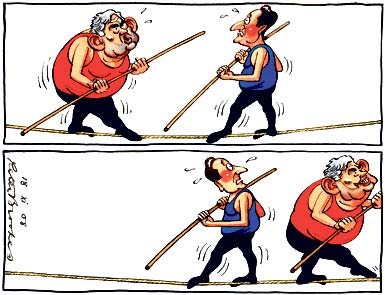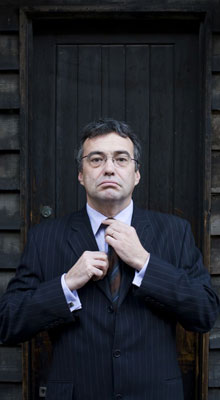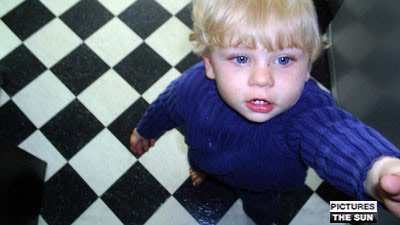What was all that about then? Already the furore over Jonathan Ross and Russell Brand's insulting remarks about a Satanic Slut to her grandfather seem like ancient history; we have, as Tony Blair so often urged us to do, moved on. The new pastures are much greener. Not content with just creating a moral panic, in all senses of the term, over Baby P, while making the lives of those involved with his case a living hell, we also have John Sergeant and Strictly Come Dancing to be aggravated about! Did he jump or was he pushed? Did the maniacal BBC step in end the tyrant's defiance of the judges and save their blushes? Complain to Ofcom about it! A whole collection of other people taking a shallow television contest too seriously already have!
The publishing of the BBC Trust report (PDF) into "Sachsgate" or fuckedyourgranddaughtergate or aren'tweabunchofhypocriticalcuntsgate has then turned out to be rather underwhelming. Oh, the Mail still had to splash Ross's face on this morning's front page just to keep up appearances, but even it seems to have lost heart in it.
While the report does show some fairly damning editorial failures, with it turning out that the Director of Radio 2 hadn't listened to the show before it aired and that the Head of Compliance had only listened to the part where Ross blurted out the "fucked your granddaugter" line, with them deciding that it was OK to go out as they thought Sachs had agreed to it, resulting in broadcasting a caution before the show went out, what really seems to have turned the whole thing is a misconstrued conversation between the producer Nic Phelps and Andrew Sachs himself, when Phelps contacted him to ask if what had been recorded could go out:
The Producer also telephoned Andrew Sachs. Their accounts of what each took from the conversation differ and Mr Sachs believes it may have taken place on Wednesday afternoon rather than Thursday, although the time difference does not appear material and on either account no proper consent was obtained such as to justify transmission of the material in question.
The Producer said the conversation was cordial. He asked whether Mr Sachs had heard the messages and Mr Sachs said that he had, adding words to the effect of ‘they’re a bit wild, aren’t they’. The Producer asked whether the programme could use the recordings and he recalls Mr Sachs saying ‘Yes, as long as you tone it down a bit’, or words to that effect.
The Producer said there was then a discussion about Mr Sachs appearing on a future edition of the programme and the conversation ended amicably with the Producer agreeing to contact him again about a date for his appearance.
Andrew Sachs, for his part, confirmed that the Producer sought his consent but says he demurred. He recognised, however, that he did not do so in strong terms and he agreed that he said that the content needed toning down. He added that he would have reacted more strongly had he heard everything that had been said on the programme.
Mr Sachs also agreed that the conversation went on to discuss his possible future appearance on the programme which by now he knew had been pre-recorded that week. Mr Sachs understood this future appearance was to be instead of using the material which had already been recorded.
Mr Sachs was prepared to accept that it was possible the Producer had taken away the view that his consent had been obtained and that the future appearance was in addition to the transmission of the existing material, but in his view that would, at best, have been ‘wishful thinking’.
Sachs it seems, despite listening to some of the messages left, did not hear Ross swearing or the sung "apology" song, but came away with the impression that the material regarding Georgina Baillie was to be cut. Phelps, for his part, felt that Sachs had given his permission for some of it to broadcast as long as it was, in Sachs' words, "toned down a bit". He did subsequently cut some of it, as newspapers nonetheless rejoiced in reprinting, but large parts of it did go out.
The report goes on:
The Producer did not check what Mr Sachs had actually heard on his voicemail, made no record of his conversation with Mr Sachs and no file note was made afterwards. Even if one accepts the Producer’s account, it remains clear that no proper consent was obtained. Consent in these circumstances would depend on ensuring that Mr Sachs was properly aware of what the programme intended to say about him and his family and what was to be edited out in order to tone it down. Nor could Mr Sachs consent on behalf of his grand-daughter whose separate consent would also be required. However, other than a voicemail that Russell Brand is said to have left for Ms Baillie, no steps appear to have been taken to obtain informed consent from Ms Baillie.
The BBC Trust seems to be going out of its way here to declare its independence, as it also has by rejecting the plans for the ultra-local news video sites, which will delight its competitors. A misunderstanding results in a mistake which could have been sorted out, but there was no real malice to any of the comments. Ross apparently told the Trust that he was only happy for the material to go out as long as Sachs and Baillie had given their consent, and Brand told him that they had. Brand had left a message on Baillie's own voicemail which described the messages and apologised for what was said, but not sought actual consent. Only 2 people complained about the show over the weekend. It was when the Mail on Sunday hack got involved that the story itself was set in motion. Even then the BBC could have prevented some of the fallout if the Radio 2 Director, Lesley Douglas, had responded to the request for an apology from Sachs's agent. As it was, she was on holiday, and didn't see it until Sunday evening when the MoS had already splashed on it. She had wanted to apologise as soon as she knew about the MoS story, but the BBC had wanted to do things officially, through their own Corporate Press Office. As a result of doing things "properly", the apology wasn't made until Monday, by which time Paul Dacre had apparently been enraged by Brand referring to the Mail's support for the Nazis during the 30s when he "apologised" on the follow-up show. It was somewhat slow in reacting, but not overly so considering.
Consequently, the Head of Compliance and Radio 2 director resigned, Brand quit his show, and the puritans that had been so losing the battle over what can and cannot be broadcasted have chalked up a massive victory, almost all down to the BBC's own pusillanimity and self-harm on a grand scale. Newspapers are again running campaigns against swearing on TV, as we simply can't have what we watch reflecting reality, and the Sunday Torygraph has gone so far to rail against "Vulgar Britain", a newspaper formerly owned by a convicted fraudster and now by two recluses who live on a tiny island fortress and threaten to sue if their name is so much as mentioned elsewhere in the press. Running so scared, the Trust also rakes Ross further over the coals for two swearwords on his chat show, made by a complainant with the usual grudges against the corporation:
The complainant wrote an email to the Director-General on 6 May 2008 via the BBC Complaints website. In the email he outlined his complaint against the previous Friday evening’s Friday Night with Jonathan Ross show requesting that he wanted an “absolute assurance” that Jonathan Ross would be taken off air after his “foul mouth outbursts” to two of his guests. The complainant believed the use of such language was a result of “a BBC run by trendy left wing liberals” of which, he said, Mr Ross was one. He closed his email by stating:
“You have disgusted me and I suspect just about every English person.”
That both guests had led him on was apparently irrelevant, as was, if the complainant didn't like it, he could change the channel. Instead it's his divine right to demand that Ross be completely taken off the air. Such bending over backwards to limited complaints results in the following, one of the BBC's other actions as a result of tediousgate:
Alan Yentob (Creative Director, BBC) together with Roly Keating (Director of Archive Content) and Claire Powell (Chief Adviser, Editorial Policy) will lead a group examining where the appropriate boundaries of taste and generally accepted standards should lie across all BBC output. The group will involve members of the on-air talent community and outside perspectives, together with original audience research. It will report to the BBC’s Editorial Standards Board in February 2009 and its conclusions will be reported to the BBC Trust. It will inform the revision of the BBC’s Editorial Guidelines which is currently underway and scheduled to be completed in 2009.
Hopefully they will not throw the baby out with the bathwater. After the simpering and pathetic nature of the BBC's grovelling to those who won't be satisfied until it's gone, I wouldn't bet on it.Labels: "Sachsgate", Andrew Sachs, BBC, BBC bashing, Daily Mail, Daily Mail-watch, Georgina Baillie, Jonathan Ross, media coverage, media hysteria, Russell Brand






